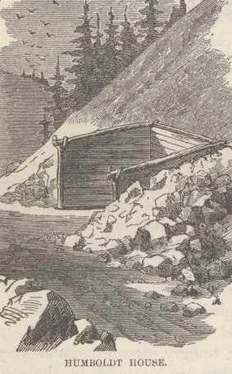Mark Twain - The Innocents Abroad
Здесь есть возможность читать онлайн «Mark Twain - The Innocents Abroad» весь текст электронной книги совершенно бесплатно (целиком полную версию без сокращений). В некоторых случаях можно слушать аудио, скачать через торрент в формате fb2 и присутствует краткое содержание. Год выпуска: 2004, Жанр: Классическая проза, Юмористическая проза, на английском языке. Описание произведения, (предисловие) а так же отзывы посетителей доступны на портале библиотеки ЛибКат.
- Название:The Innocents Abroad
- Автор:
- Жанр:
- Год:2004
- ISBN:нет данных
- Рейтинг книги:5 / 5. Голосов: 1
-
Избранное:Добавить в избранное
- Отзывы:
-
Ваша оценка:
- 100
- 1
- 2
- 3
- 4
- 5
The Innocents Abroad: краткое содержание, описание и аннотация
Предлагаем к чтению аннотацию, описание, краткое содержание или предисловие (зависит от того, что написал сам автор книги «The Innocents Abroad»). Если вы не нашли необходимую информацию о книге — напишите в комментариях, мы постараемся отыскать её.
The Innocents Abroad — читать онлайн бесплатно полную книгу (весь текст) целиком
Ниже представлен текст книги, разбитый по страницам. Система сохранения места последней прочитанной страницы, позволяет с удобством читать онлайн бесплатно книгу «The Innocents Abroad», без необходимости каждый раз заново искать на чём Вы остановились. Поставьте закладку, и сможете в любой момент перейти на страницу, на которой закончили чтение.
Интервал:
Закладка:
In France, all is clockwork, all is order. They make no mistakes. Every third man wears a uniform, and whether he be a marshal of the empire or a brakeman, he is ready and perfectly willing to answer all your questions with tireless politeness, ready to tell you which car to take, yea, and ready to go and put you into it to make sure that you shall not go astray. You cannot pass into the waiting room of the depot till you have secured your ticket, and you cannot pass from its only exit till the train is at its threshold to receive you. Once on board, the train will not start till your ticket has been examined—till every passenger's ticket has been inspected. This is chiefly for your own good. If by any possibility you have managed to take the wrong train, you will be handed over to a polite official who will take you whither you belong and bestow you with many an affable bow. Your ticket will be inspected every now and then along the route, and when it is time to change cars you will know it. You are in the hands of officials who zealously study your welfare and your interest, instead of turning their talents to the invention of new methods of discommoding and snubbing you, as is very often the main employment of that exceedingly self-satisfied monarch, the railroad conductor of America.
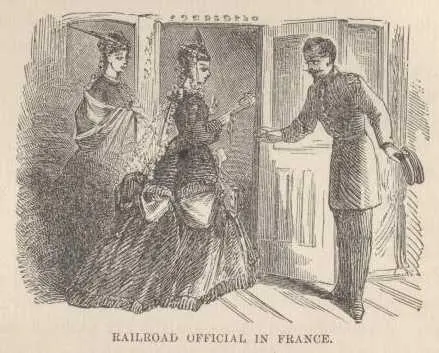
But the happiest regulation in French railway government is—thirty minutes to dinner! No five-minute boltings of flabby rolls, muddy coffee, questionable eggs, gutta-percha beef, and pies whose conception and execution are a dark and bloody mystery to all save the cook that created them!
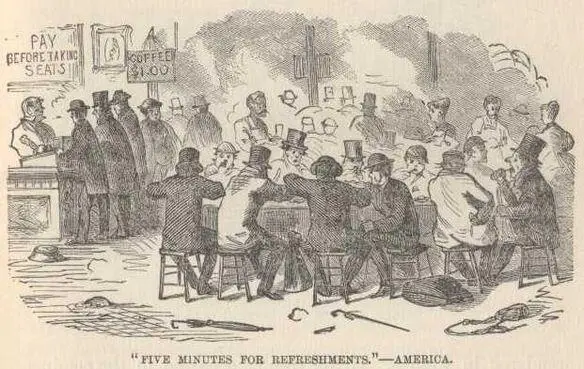
No, we sat calmly down—it was in old Dijon, which is so easy to spell and so impossible to pronounce except when you civilize it and call it Demijohn—and poured out rich Burgundian wines and munched calmly through a long table d'hote bill of fare, snail patties, delicious fruits and all, then paid the trifle it cost and stepped happily aboard the train again, without once cursing the railroad company. A rare experience and one to be treasured forever.
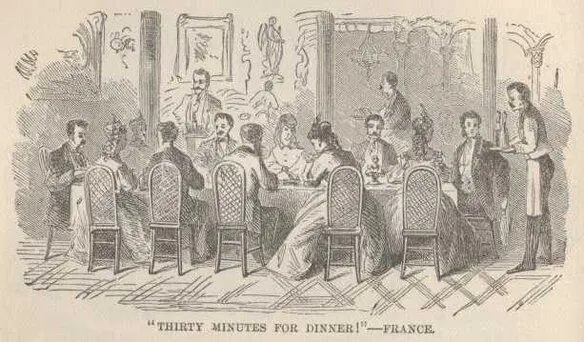
They say they do not have accidents on these French roads, and I think it must be true. If I remember rightly, we passed high above wagon roads or through tunnels under them, but never crossed them on their own level. About every quarter of a mile, it seemed to me, a man came out and held up a club till the train went by, to signify that everything was safe ahead. Switches were changed a mile in advance by pulling a wire rope that passed along the ground by the rail, from station to station. Signals for the day and signals for the night gave constant and timely notice of the position of switches.
No, they have no railroad accidents to speak of in France. But why? Because when one occurs, somebody has to hang for it! Not hang, maybe, but be punished at least with such vigor of emphasis as to make negligence a thing to be shuddered at by railroad officials for many a day thereafter. "No blame attached to the officers"—that lying and disaster-breeding verdict so common to our softhearted juries is seldom rendered in France. If the trouble occurred in the conductor's department, that officer must suffer if his subordinate cannot be proven guilty; if in the engineer's department and the case be similar, the engineer must answer.
The Old Travelers—those delightful parrots who have "been here before" and know more about the country than Louis Napoleon knows now or ever will know—tell us these things, and we believe them because they are pleasant things to believe and because they are plausible and savor of the rigid subjection to law and order which we behold about us everywhere.
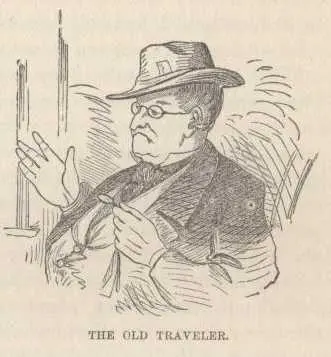
But we love the Old Travelers. We love to hear them prate and drivel and lie. We can tell them the moment we see them. They always throw out a few feelers; they never cast themselves adrift till they have sounded every individual and know that he has not traveled. Then they open their throttle valves, and how they do brag, and sneer, and swell, and soar, and blaspheme the sacred name of Truth! Their central idea, their grand aim, is to subjugate you, keep you down, make you feel insignificant and humble in the blaze of their cosmopolitan glory! They will not let you know anything. They sneer at your most inoffensive suggestions; they laugh unfeelingly at your treasured dreams of foreign lands; they brand the statements of your traveled aunts and uncles as the stupidest absurdities; they deride your most trusted authors and demolish the fair images they have set up for your willing worship with the pitiless ferocity of the fanatic iconoclast! But still I love the Old Travelers. I love them for their witless platitudes, for their supernatural ability to bore, for their delightful asinine vanity, for their luxuriant fertility of imagination, for their startling, their brilliant, their overwhelming mendacity!
By Lyons and the Saone (where we saw the lady of Lyons and thought little of her comeliness), by Villa Franca, Tonnere, venerable Sens, Melun, Fontainebleau, and scores of other beautiful cities, we swept, always noting the absence of hog-wallows, broken fences, cow lots, unpainted houses, and mud, and always noting, as well, the presence of cleanliness, grace, taste in adorning and beautifying, even to the disposition of a tree or the turning of a hedge, the marvel of roads in perfect repair, void of ruts and guiltless of even an inequality of surface—we bowled along, hour after hour, that brilliant summer day, and as nightfall approached we entered a wilderness of odorous flowers and shrubbery, sped through it, and then, excited, delighted, and half persuaded that we were only the sport of a beautiful dream, lo, we stood in magnificent Paris!
What excellent order they kept about that vast depot! There was no frantic crowding and jostling, no shouting and swearing, and no swaggering intrusion of services by rowdy hackmen. These latter gentry stood outside—stood quietly by their long line of vehicles and said never a word. A kind of hackman general seemed to have the whole matter of transportation in his hands. He politely received the passengers and ushered them to the kind of conveyance they wanted, and told the driver where to deliver them. There was no "talking back," no dissatisfaction about overcharging, no grumbling about anything. In a little while we were speeding through the streets of Paris and delightfully recognizing certain names and places with which books had long ago made us familiar. It was like meeting an old friend when we read Rue de Rivoli on the street corner; we knew the genuine vast palace of the Louvre as well as we knew its picture; when we passed by the Column of July we needed no one to tell us what it was or to remind us that on its site once stood the grim Bastille, that grave of human hopes and happiness, that dismal prison house within whose dungeons so many young faces put on the wrinkles of age, so many proud spirits grew humble, so many brave hearts broke.
We secured rooms at the hotel, or rather, we had three beds put into one room, so that we might be together, and then we went out to a restaurant, just after lamplighting, and ate a comfortable, satisfactory, lingering dinner. It was a pleasure to eat where everything was so tidy, the food so well cooked, the waiters so polite, and the coming and departing company so moustached, so frisky, so affable, so fearfully and wonderfully Frenchy! All the surroundings were gay and enlivening. Two hundred people sat at little tables on the sidewalk, sipping wine and coffee; the streets were thronged with light vehicles and with joyous pleasure-seekers; there was music in the air, life and action all about us, and a conflagration of gaslight everywhere!
Читать дальшеИнтервал:
Закладка:
Похожие книги на «The Innocents Abroad»
Представляем Вашему вниманию похожие книги на «The Innocents Abroad» списком для выбора. Мы отобрали схожую по названию и смыслу литературу в надежде предоставить читателям больше вариантов отыскать новые, интересные, ещё непрочитанные произведения.
Обсуждение, отзывы о книге «The Innocents Abroad» и просто собственные мнения читателей. Оставьте ваши комментарии, напишите, что Вы думаете о произведении, его смысле или главных героях. Укажите что конкретно понравилось, а что нет, и почему Вы так считаете.
